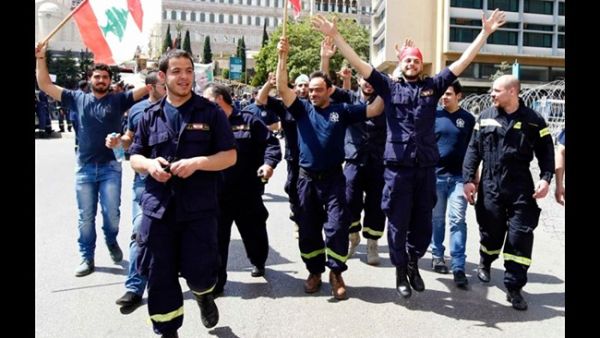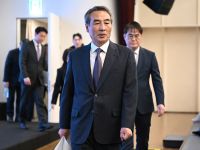The Cabinet Wednesday approved a decree that would pave the way for making Civil Defense volunteers full-time employees, defusing nearly five months of street protests, but avoided discussion on a controversial proposal to add a new tax on fuel.
The Cabinet also approved LL50 billion to buy ammunition to the Lebanese Army.
Finance Minister Ali Hasan Khalil announced through his Twitter account the adoption of the Civil Defense bill, which was the first item on the Cabinet’s agenda.
“After the interior minister underlined the need to issue the Civil Defense decree, the Cabinet discussed it, and as a result of the deliberations it decided to approve a draft decree aimed at setting the conditions relating to the two jobs of [Civil Defense center] head and a Civil Defense member in the Directorate General of Civil Defense,” Information Minister Ramzi Joreige told reporters after the Cabinet meeting chaired by Prime Minister Tammam Salam at the Grand Serail.
Civil Defense volunteers, who had gathered earlier at Beirut’s Martyrs’ Square to press the government for their demands, were overjoyed with the Cabinet move.
“What happened today was the key to the entire issue,” Civil Defense spokesperson Bassam Ansar told The Daily Star. Ansar said the decree would make heads of Civil Defense centers full-timers. The government has yet to approve three decrees that would make other volunteers full-timers, he said.
Civil Defense volunteers have been staging a sit-in in Martyrs’ Square since September, demanding the Cabinet approve decrees to make them full-time employees after the law was passed in Parliament in April 2014.
Joreige said the ministers stressed the importance of “approving a state budget, rationalizing spending, stopping squandering of public funds and fighting corruption.”
Khalil, the finance minister, presented a comprehensive report on the state finances, indicating that revenues were less than spending. He stressed the need to increase revenues in order to meet the ministries’ demands for higher allocations.
According to Joreige, Khalil said any additional spending would increase the state deficit, adding that any further expenditures should be accompanied by extra revenues.
Ministers avoided discussing a proposal made at last week’s session by Interior Minister Nouhad Machnouk to impose a LL3,000 tax on every 20 liters of gasoline to cover the costs of making Civil Defense volunteers full-time employees. Another Cabinet meeting will be held Thursday when the fuel tax proposal is likely to be brought up for discussion. Ministerial sources said increasing taxes, particularly the fuel tax, is inevitable in order to cover additional spending. There is an annual $1.5 billion to $2 billion deficit in Lebanon’s electricity sector alone.
A spat erupted between Khalil and Education Minister Elias Bou Saab, who accused the finance minister of failing to approve salaries of contract teachers. Khalil responded by accusing Bou Saab of negligence by failing to send a timetable of teachers’ salaries to the Finance Ministry on time.
Several ministers voiced their objections to the fuel tax proposal before entering the session. Energy Minister Arthur Nazarian said he was against any new tax increase.
Foreign Minister Gebran Bassil said Nazarian is the only concerned party, adding that if this plan is passed, “the government should create a fund.”
Bou Saab said that the government should stop wasting public funds before imposing new taxes on the citizens. Economy Minister Alain Hakim said he rejected any “increase [of costs] on the citizen.”
A small demonstration was held in front of the Grand Serail where activists warned of escalatory measures if the fuel tax was added.
The Union Coordination Committee, which had planned to stage a strike Thursday if the Cabinet decided to impose a tax on fuel, announced the suspension of the strike. However, the UCC, which represents civil servants and public and private school teachers, warned it would take “negative and escalatory steps if the Cabinet imposed new taxes affecting limited income people.”
For his part, Speaker Nabih Berri urged the Cabinet to prioritize oil exploration decrees. “This issue should be on the top of the Cabinet agenda and it cannot stand further delay and procrastination,” Berri was quoted as saying by MPs during his weekly meeting with lawmakers at his Ain al-Tineh residence.
While five years have passed since the ratification of the Offshore Petroleum Resources Law, the government has yet to issue two decrees that would pave the way for the first licensing round for offshore gas exploration in Lebanon’s exclusive economic zone.
The decrees would define the number of blocks in the EEZ and establish a revenue mechanism, as well as a tax policy for the country’s promising oil and gas exploration sector.
Meanwhile, the parliamentary Future bloc lashed out at Hezbollah and the Free Patriotic Movement for scuttling Monday’s Parliament session to elect a president by boycotting it, and accused them of trying to create a totalitarian political system. “Their boycott of the 35th Parliament session was a new blatant and rejected attempt at obstruction. They [Hezbollah and the FPM], with their allies, are trying to appoint a president and control the will of the Lebanese people who are determined to elect a new president,” the bloc said in a statement after its weekly meeting chaired by former Prime Minister Fouad Siniora.
“The bloc and the majority of the Lebanese people strongly and firmly reject attempts made by Hezbollah and the FPM to impose new unconstitutional practices aimed at setting up a totalitarian political system,” it added.
By Hussein Dakroub and Hasan Lakkis









